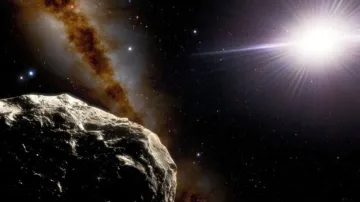NASA has issued a warning about a massive asteroid named 2024 MT1, which is currently barreling towards Earth at a staggering speed of 65,215 km/h. This asteroid, with a diameter of approximately 260 feet, is roughly the size of the Statue of Liberty and poses a significant interest to both scientists and space enthusiasts.
Close approach
Asteroid 2024 MT1 will make its closest Earth approach on July 8. During this time, it will pass about 1.5 million kilometres from our planet, which is roughly four times the distance between Earth and the Moon. While this may seem far, in astronomical terms, it is considered a close shave, especially for an object of this size. The proximity and size of 2024 MT1 classify it as a potentially hazardous asteroid (PHA), meaning that while there is no immediate threat of collision, its path warrants close monitoring due to the potential for future risks.
Detection and Tracking
The asteroid was first detected by NASA’s Near-Earth Object Observations Program, which is dedicated to identifying and characterizing asteroids and comets that come close to Earth. This program utilizes a network of ground-based telescopes and radar systems to keep tabs on these celestial bodies. Currently, NASA’s Jet Propulsion Laboratory (JPL) in Pasadena, California, is tracking the asteroid’s trajectory closely. JPL’s Asteroid Watch dashboard provides real-time updates on the asteroid's position, speed, and distance from Earth, ensuring that scientists and the public are kept informed about its approach.
Planetary defense
While there is no immediate danger of asteroid 2024 MT1 colliding with Earth, NASA’s Planetary Defense Coordination Office (PDCO) proactively develops strategies to mitigate potential asteroid threats. The PDCO collaborates with international space agencies and research institutions to devise technologies aimed at asteroid deflection and impact prevention. One of the most notable initiatives is the Double Asteroid Redirection Test (DART) mission, which aims to demonstrate the capability to alter an asteroid’s trajectory by deliberately crashing a spacecraft into it. This mission represents a significant step towards safeguarding Earth from potential future asteroid impacts.
Astronomical interest
The impending close approach of asteroid 2024 MT1 has generated considerable excitement among the scientific community and space enthusiasts alike. Observatories around the globe are preparing to capture images and gather data as the asteroid makes its flyby. Researchers are particularly interested in studying the asteroid’s composition and structure, as these can offer valuable insights into the conditions and materials present in the early solar system. Understanding the makeup of such asteroids not only helps in planetary defence efforts but also contributes to our knowledge of planet formation processes.
In summary, while asteroid 2024 MT1’s approach poses no immediate threat, it serves as a stark reminder of the importance of monitoring near-Earth objects and preparing for any potential future threats. As scientists gear up to study this celestial visitor, their findings could provide crucial information to protect our planet from the dangers of space.
Keeping Updated
For those interested in following the progress of asteroid 2024 MT1, NASA’s JPL provides real-time updates and detailed information on its Asteroid Watch dashboard. This resource is invaluable for staying informed about the asteroid’s path and any new developments as they occur.
As we continue to explore and understand the cosmos, the monitoring and study of objects like 2024 MT1 remain critical to both our scientific knowledge and planetary safety.
ALSO READ: ISRO's Aditya-L1 solar probe completes first orbit around Sun-Earth L1 point
ALSO READ: Now doctors can identify cancer patient’s recovery during chemotherapy with this device
